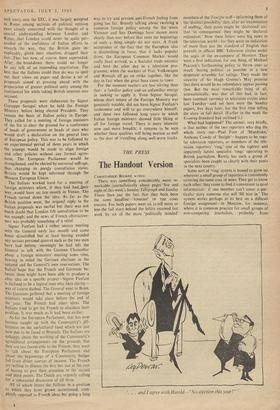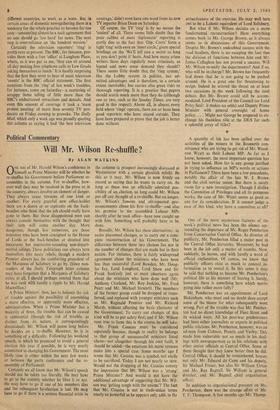THE PRESS
The Handout Version
CHRISTOPHER BOOKER writes: There was something considerably more re- markable: journalistically about pages five and eight of this week's Sunday Tgegraph and Sunday Times than just the fact that they both bore the same headline =TONIGHT' OF THE LONG KNIVES. For both papers went on to tell more or less' the full story behind the letters received last week by six of the more 'politically minded' members of the Tonight staff—informing them of the 'distinct possibility' that, after an 'examination of staffing,' their posts might be 'decreased' ant that 'in consequence' they might be 'declared redundant.' Now these letters were big news in the television world—for they were an-indication of more than just the standard of English that prevails in official BBC Television circles under the aegis of the ex-compere of Monitor. They were a first indication, for one thing, of Michael Peacock's forthcoming policy to throw over as much 'boring politics' as possible in a new desperate• scramble for ratings. They made the sincerity of Sir Hugh Greene's May promise that there would be no redundancy appear passing thin. But the most remarkable thing of all, journalistically, was that all this had, in fact, been common currency in television circles since last 'Tuesday—and yet here were the Sunday papers, five days later, for the first time telling the story in full detail. (Earlier in the week the Evening Standard had outlined it.) What had happened? The answer, very briefly, is that neither of the two reporters who dug the, whole story out—Paul Foot of 'Mandrake,' Anthony Cowdy of Insight'—happen to be regu- lar television reporters, or members of the tele- vision reporters' 'ring,' one of the tightest and apparently laziest specialist 'rings' operating in British journalism. Rarely has such a group of specialists been caught so clearly with their pants in the next county. Some sort of 'ring' system is bound to grow up wherever a small group of reporters is consistently covering the same area of news. They get to know each other, they come to find it convenient to pool information: if one member can't cover a par- ticular story someone else will 'fill him in.' The system works perhaps at its best on a difficult foreign assignment—in Moscow, for • instance,. where it is common practice for small groups of non-competing journalists, probably from ' . . . and I agree with.Harold—"No election this year!" '
different countries, to work as a team. But in certain areas of domestic newsgathering there is a tendency for the whole practice to become far too cosy—amounting almost to a tacit agreement that no one should go `too hard' for news. The next step is over-reliance on 'the handout version.'
Certainly the television reporters' ring' is pretty cosy at present. The BBC, for instance, pro- vides them with a free `office' at Langham• Place, where, as it was put to me, 'they can sit around all day making free telephone calls to Lew Grade asking themselves to lunch.' It is hardly surprising that the first they seem to hear of most television `events' is the BBC official statement. The first mentions from the 'ring' of last week's troubles, for instance, came on Saturday—a scattering of scrappy items telling of little more than the BBC's embarrassed retractions and denials. And even this amount of coverage it took a 'mass protest meeting' of more than seventy TV pro- ducers on Friday evening to provoke. The Daily Mail, which only a week ago was proudly quoting this column as saying it had 'the best television coverage,' didn't even have one word from its new TV reporter Brian Dean on Saturday.
Of course, the TV 'ring' is by no means the 'cosiest' of all. There seems little doubt that the poor calibre of most 'diplomatic' reporting is partly due to the fact that `Dip. Corrs' form a tight 'ring' with even an `inner circle,' given special briefings on the 'We'll tell you a secret so long as you don't print it' basis. And how many crime writers these days regularly meet criminals, as legend and news sense demand they should? There seems little doubt that the `ring system,' like the Lobby system in politics, has ad- mitted advantages and is therefore, to a certain extent inevitable; but carries also great risks to thorough reporting. It is a practice that papers should watch much more than they do (although one or two, such as the Sunday Times, are very good in this respect). Above all, in almost every field where `rings' operate, there are or have been good reporters who have stayed outside. They have been prepared to prove that the job is better done without.











































 Previous page
Previous page